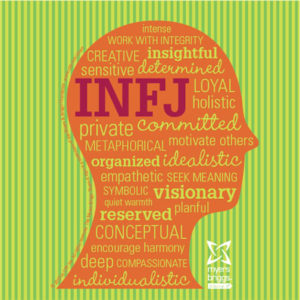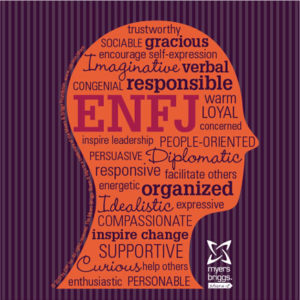In the College, we use the Myers Briggs Typology Indicator as a tool for leaders to gain insight about themselves and their organizations. One mistake that’s easy to make when using the MBTI is to simply add up your preferences and call it good: I prefer Extraversion, so that’s “E,” I prefer Intuition, so that’s “N,” I prefer Feeling, so that’s “F,” and I prefer Judging, so that’s “J”… therefore, I prefer ENFJ, and I’m good to go.
It’s just not that simple.
In a recent training, I worked with another trainer to describe how just one difference in preference makes a big difference in how our shared preferences are expressed. He prefers INFJ, and I prefer ENFJ. See below how that one small difference—he prefers Introversion, and I prefer Extraversion—makes a big difference in our shared preferences.
First, let’s look at INFJ. Here’s a portion of the INFJ description from the “Introduction to Type” booklet:
 “INFJs seek meaning and connection in their lives. They have little use for details unless they fit with their inner vision. They use their Intuition primarily internally, where they develop sweeping, complex pictures and understandings. INFJs are likely to be
“INFJs seek meaning and connection in their lives. They have little use for details unless they fit with their inner vision. They use their Intuition primarily internally, where they develop sweeping, complex pictures and understandings. INFJs are likely to be
- Insightful, creative, and visionary
- Conceptual, symbolic, and metaphorical
- Idealistic, complex, and deep”
There’s much more to know about INFJs, but let’s compare that little bit with the same section on the ENFJ page:
“ENFJs base their decisions on personal values. They use their Feeling primarily externally, radiating warmth and energy. They look for and find the best in others and prize harmony and cooperation. ENFJs are warmed by approval, responding with energy and devotion, and are especially sensitive to criticism and tension. They are likely to be
 Warm, compassionate, and supportive
Warm, compassionate, and supportive- Loyal and trustworthy”
Do you see how different these types are? And they share three of the four preferences measured by MBTI! MBTI theory says that the four preferences interact dynamically, so just one difference alters significantly how the other preferences are experienced and expressed. INFJs lead with their Intuition (an information-gathering function), which is introverted and informed by their Feeling (a decision-making function). ENFJs lead with their Feeling, which is extraverted and informed by their Intuition. All that lingo adds up to this: when we’re talking personality types, one small difference makes a big difference.
Can you see how this could inform and deepen your understanding of yourself as a leader, and the gifts (and blind spots) of your congregation?